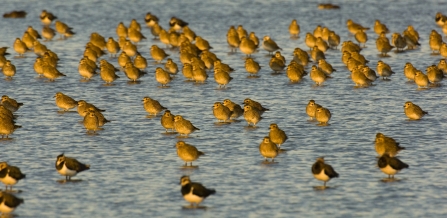
Horsey Island nature reserve. Photo, Martin Batt
Horsey Island
Know before you go
Dogs
When to visit
Opening times
Open all yearBest time to visit
Excellent at any time but especially spring and autumn migrationsAbout the reserve
Devon Wildlife Trust purchased Horsey Island in November 2019 with the generous help of local resident and bird watcher, Mr Mark Ansell.
The 80 hectare site was once grazing land protected by an earth bank sea wall. In 2017 (before our ownership) this sea wall was breached allowing sea water in.
Since then, this breach has grown considerably and Horsey Island is now covered by each incoming tide. As a result grassland has been replaced by a dynamic landscape of mudflats, sandbanks and saltmarsh.
Salt tolerant plants such as sea purslane and glasswort (samphire) have taken root, while thousands of wading and other birds rest and feed on the nature reserve.
Recent bird sightings have included ospreys, spoonbills, glossy ibis, cattle egret, great white egret and ruff. Bird counts of 2,000 golden plover and 200+ lapwing have also been recorded.
Horsey Island is now one of the top places in Devon for birdwatching.
Visiting Horsey Island
As our newest nature reserve the visitor facilities at Horsey Island are minimal. We hope to install simple visitor signage soon, but longer term plans for better path access, bird hides, etc remain aspirations at this stage.
The dynamic state of the reserve and especially the vulnerable nature of its boundary sea wall mean there is no direct public access on to the reserve at present. However, excellent viewing points are available from its inland perimeter along the South West Coast Path.
Keen on cycling? Braunton Countryside Centre has developed a Komoot cycle route for Horsey Island. Click here to check it out!
Ash dieback
The disease ash dieback is now widespread in the UK and is present at many of our nature reserves, so we carry out tree felling across our sites in winter months. For your own safety please observe temporary path diversions and closures.
Where possible we will leave affected ash trees in place to decay naturally as an important habitat for wildlife. We plan to only fell diseased ash trees which pose a threat to people or infrastructure. Before trees are felled, we will check whether any rare or protected wildlife is present. If it is, we will postpone or avoid felling these trees. No felling will take place during the bird nesting season.
DWT’s Saving Devon’s Treescapes project are working with communities, landowners and businesses to help make Devon's precious treescapes more resilient in the face of ash dieback. Find out how you can get involved here.
NOTICE: If you are visiting our reserves, please note that there have been instances of H5N1 Avian bird flu found in birds in Devon. There is very low risk to public health, but we do ask that if you come across any unusual or unexplained bird deaths on or near our reserves please do not touch them and report them to Defra here or call 03459 335577. Please also report your findings to DWT by email at contactus@devonwildlifetrust.org
Contact us
Read here our statement regarding Horsey Island outer bank erosion
Horsey Island Statement


Golden plover. Photo, Andy Parkinson


